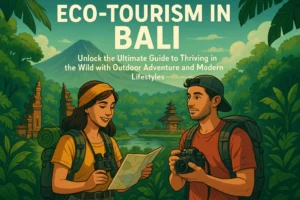Eco-Tourism in Bali: Unlock the Ultimate Guide to Thriving in the Wild with Outdoor Adventure and Modern Lifestyles

Discover how Bali’s vibrant eco-tourism and thrilling outdoor adventures are transforming modern lifestyles. Experience responsible travel, deep nature connection, and sustainable practices on the Island of the Gods.
In a perpetually plugged-in, stressed-out world, a powerful movement is taking hold: the embrace of outdoor adventure and eco-tourism. For centuries, Bali, the “Island of the Gods,” has enchanted visitors with its vibrant culture and lush landscapes. Now, more than ever, Bali exemplifies how this global lifestyle shift is unfolding, transforming not just travel, but daily life.
This isn’t merely about seeking thrills or ticking off bucket-list destinations. It’s a profound recalibration. Millions are consciously prioritizing well-being, sustainability, and authentic connection. From scaling volcanoes to diving coral reefs, and from rice field walks to supporting conservation, people are rediscovering nature’s transformative power and community. This fundamentally reshapes their habits, travel choices, and values.
This article explores the compelling forces behind this phenomenon through Bali’s unique environment and cultural ethos. We’ll delve into the psychological and physical benefits, economic impact, and the crucial role of responsible travel and community engagement for a sustainable future for this paradise island. Get ready to breathe deeply, look around, and consider how the Balinese wild might just be calling you home.
The Great Outdoors Calling: A Wellness Revolution Rooted in Bali’s Nature
The modern urban grind, with its relentless pace and constant digital hum, has taken a toll on collective well-being. Burnout is rampant, and mental health challenges are on the rise. It’s no wonder individuals seek solace and strength in the natural world – and Bali, with its spiritual essence and abundant natural beauty, offers an irresistible sanctuary.
Outdoor adventure in Bali acts as a powerful antidote. Engaging in activities like trekking Mount Batur for sunrise, cycling through emerald rice paddies, navigating white-water rapids, or exploring hidden waterfalls isn’t just physical exertion; it’s a holistic experience nourishing mind, body, and soul.
Physical Prowess & Vitality
Regular engagement with Bali’s diverse outdoor activities significantly boosts physical health. This includes improved cardiovascular function from challenging treks, enhanced muscular strength from surfing waves, better weight management, and increased Vitamin D synthesis from glorious tropical sunlight exposure. A 2025 study highlighted that individuals engaging in outdoor exercise experienced greater reductions in blood pressure and stress hormone levels compared to those exercising indoors – a benefit Bali’s fresh air readily provides. It’s a workout that feels like an exploration through paradise.
Mental Clarity & Stress Reduction
The calming effect of Bali’s lush rice fields, pristine beaches, and serene temples is well-documented. Spending time in these green and and blue spaces reduces anxiety, lowers stress levels, and elevates mood. Research by the National Academy of Sciences (dofollow) found that a 90-minute walk in a natural setting reduced neural activity in the brain region associated with rumination, a key factor in anxiety and depression – a perfect excuse for a Balinese rice field stroll! The fresh air, natural light, and serene landscapes provide a much-needed respite from digital overload, fostering mindfulness and improving cognitive function. It’s a natural reset button for the mind, especially potent in Bali’s spiritual atmosphere.
Enhanced Creativity & Problem Solving
Ever noticed how ideas flow more freely when immersed in Bali’s inspiring scenery? Studies suggest that exposure to nature enhances creativity and problem-solving skills. The island’s diverse landscapes, vibrant colors, and open spaces stimulate different areas of the brain, leading to a greater flow of innovative thoughts. It’s a testament to how stepping away from screens and into Bali’s natural artistry can unlock greater intellectual potential.
Social Connection & Community
Outdoor pursuits in Bali often provide excellent opportunities for building social connections. Joining local surf schools, participating in group treks to waterfalls, or simply sharing a meal with fellow adventurers fosters camaraderie and a sense of belonging. These shared experiences in nature, often facilitated by warm Balinese hospitality, contribute to greater overall life satisfaction and emotional resilience.
This growing recognition of nature’s therapeutic benefits isn’t just anecdotal; it’s woven into the fabric of Balinese life. From traditional spiritual cleansing in natural springs to simply living in harmony with the natural environment, the shift towards an outdoor-focused lifestyle is driven by a deep-seated human need for connection with the natural world, a connection Bali inherently offers.
The Rise of Eco-Tourism in Bali: Travel with a Conscience
Hand-in-hand with the surge in outdoor adventure in Bali is the remarkable growth of eco-tourism, and Bali is at its forefront. This isn’t just about visiting beautiful places; it’s about doing so responsibly, minimizing environmental impact, respecting local cultures, and contributing positively to the communities and ecosystems visited.
The global eco-tourism market is experiencing significant growth. Bali, despite its past challenges with mass tourism, is increasingly recognized for its potential. According to GlobeNewswire (dofollow), the global eco-tourism market is expected to reach USD 551.8 billion by 2035, growing at a robust compound annual growth rate (CAGR) of 7.4%. This impressive trajectory is fueled by increasing consumer awareness about sustainability, climate change, and biodiversity conservation. Travelers, particularly millennials and Gen Z, actively seek experiences aligning with their values, moving away from mass tourism towards more meaningful and responsible encounters, and Bali is responding.
What Defines Eco-Tourism in the Balinese Context?
Eco-tourism in Bali is a form of sustainable travel that typically involves:
- Minimizing Impact: Reducing carbon footprints, conserving resources, and properly managing waste. Bali has even implemented a ban on single-use plastics.
- Environmental Conservation: Supporting efforts to preserve Bali’s fragile ecosystems, from coral reefs to rainforests, and its unique wildlife.
- Benefiting Local Communities: Ensuring economic benefits flow directly to the local Balinese population, creating jobs and supporting traditional businesses, often tied to Tri Hita Karana.
- Cultural Preservation: Respecting and celebrating Bali’s rich Hindu culture, traditions, and ceremonies, ensuring tourism enhances, rather than erodes, local ways of life. New Bali rules emphasize this respect.
- Education and Awareness: Fostering greater understanding of Bali’s environmental issues, cultural nuances, and conservation efforts among travelers.
Bali’s Inspiring Eco-Tourism Destinations and Activities
The beauty of eco-tourism lies in its diversity, and Bali offers an incredible canvas for responsible exploration. It encompasses a wide range of experiences prioritizing sustainability and authenticity.
Some shining examples of eco-tourism destinations and activities in Bali include:
- West Bali National Park: This protected area offers responsible trekking, birdwatching (home to the endangered Bali Starling), and snorkeling/diving in its pristine marine zones. Visitors contribute directly to conservation efforts.
- Jatiluwih Rice Terraces: A UNESCO World Heritage site, these stunning terraces are managed by the traditional Subak irrigation system. Visitors can trek through the paddies, learn about traditional farming, and support local farmers. Jatiluwih is highlighted as a model for sustainable tourism in Bali.
- Mount Batur & Other Volcano Treks: Popular for sunrise hikes, responsible operators ensure minimal impact on trails, proper waste disposal, and support for local guides from surrounding villages.
- Community-Based Tourism (CBT) Villages: Initiatives like those in Karangasem or rural Ubud allow visitors to immerse themselves in Balinese daily life. This might involve cooking classes, learning traditional crafts, participating in ceremonies, or agricultural experiences, ensuring direct economic benefit and cultural exchange. The Togetherness Project (dofollow) is an example of such initiatives.
- Mangrove Forests: Exploring vital ecosystems (e.g., Bali Mangrove Denpasar, Lembongan Mangrove) via traditional boat or boardwalks, often with educational components, exemplifies low-impact eco-tourism.
- Sustainable Accommodation: A growing number of hotels and guesthouses adopt eco-friendly practices – from rainwater harvesting and solar panels to sourcing local produce and employing local staff – catering to the conscious traveler.
- Responsible Diving & Snorkeling: Operators focused on preserving Bali’s marine life (e.g., around Nusa Penida, Menjangan Island) educate divers about coral conservation and responsible interaction with underwater ecosystems.
These examples illustrate how eco-tourism in Bali creates a powerful synergy between travel, conservation, and community development, offering visitors a deeper, more meaningful engagement with the island.
How Adventure and Eco-Tourism Reshape Daily Lives
The influence of outdoor adventure and eco-tourism extends far beyond vacation time. For both Balinese locals and returning visitors, it subtly, yet profoundly, reshapes everyday habits and mindsets.
- Mindful Consumption: Eco-tourists in Bali often return with heightened environmental awareness. Witnessing waste management challenges inspires them to reduce plastic use, conserve energy, opt for sustainable products, and support ethical businesses back home.
- Prioritizing Experiences Over Possessions: The thrill of a volcano trek or encountering a manta ray often supersedes the desire for material possessions. This shift in values can lead to a more minimalist lifestyle, aligning with Bali’s philosophical emphasis on spiritual well-being over material wealth.
- Increased Physical Activity: Regular outdoor adventures in Bali cultivate a love for physical activity that permeates daily life. People become more inclined to walk, cycle, or seek out local green spaces for recreation.
- Deeper Connection to Nature (Even at Home): Appreciation for nature cultivated through Balinese eco-tourism leads to a deeper connection with local environments. This might manifest as gardening, supporting local conservation, or spending more time outdoors.
- Community Engagement & Advocacy: Many who experience eco-tourism’s positive impact on Balinese communities are inspired to become advocates for sustainable practices and community empowerment, at home and abroad.
- Mental Resilience & Adaptability: Facing the challenges of outdoor adventure – like unexpected rain or navigating a busy local market – builds resilience, problem-solving skills, and adaptability. These invaluable life skills transfer directly to navigating modern daily life.
The Economic & Environmental Harmony of Eco-Tourism in Bali
Beyond individual lifestyle shifts, eco-tourism plays a vital role in both economic development and environmental protection, especially in a destination like Bali that has grappled with overtourism.
Economic Benefits of Eco-Tourism
- Job Creation: Eco-tourism directly creates jobs for local Balinese communities, from guides to artisans. This diversifies local income sources, providing sustainable livelihoods.
- Revenue for Conservation: A significant portion of revenue from eco-tourism (park fees, ethical tour charges) often directly funds conservation projects, wildlife protection (like the Bali Starling breeding program), and natural area maintenance. This provides a direct economic incentive for conservation.
- Infrastructure Development: Revenues can be reinvested in local infrastructure, education, healthcare, and other essential services within Balinese villages, improving community well-being.
- Support for Local Businesses: Eco-tourists often patronize local eateries, accommodations, and craftspeople in traditional villages, ensuring money stays within the community and supports the Balinese economy at a grassroots level.
Environmental Benefits of Eco-Tourism
- Preservation of Biodiversity: By promoting responsible behavior and generating funds for conservation, eco-tourism directly contributes to protecting Bali’s fragile ecosystems and unique species. Eco-tourists can also deter illegal activities.
- Increased Environmental Awareness: Eco-tourism educates travelers about Bali’s environmental issues, fostering deeper understanding and appreciation for its natural world. This awareness can translate into broader support for environmental policies.
- Sustainable Resource Management: Reputable eco-tourism operators adhere to sustainable practices, such as minimizing waste, conserving water and energy, and utilizing renewable resources. This aligns with traditional Balinese wisdom.
- Pressure on Policy Makers: As demand for sustainable travel in Bali grows, it pressures the Balinese government and tourism authorities to implement and enforce regulations protecting natural areas and cultural heritage, such as the new “New Bali Rules” (dofollow) emphasizing respectful and sustainable tourism.
However, it’s crucial to acknowledge that not all “eco-friendly” claims are created equal. “Greenwashing” exists, where businesses market themselves as sustainable without genuinely adopting responsible practices. This highlights the importance of travelers doing their research and choosing certified or reputable eco-tourism providers in Bali.
Navigating the Wild Responsibly: Bali’s “Leave No Trace” Ethos and Tri Hita Karana
As outdoor adventure and eco-tourism continue to flourish in Bali, responsible practices are paramount. While “Leave No Trace” principles are an internationally recognized framework, Bali offers an even deeper, culturally ingrained philosophy: Tri Hita Karana.
The Seven “Leave No Trace” Principles (and their relevance in Bali):
- Plan Ahead and Prepare: Research Balinese cultural norms, weather, and regulations.
- Travel and Camp on Durable Surfaces: Stick to marked trails to protect delicate ecosystems.
- Dispose of Waste Properly: Carry out all trash, including organic waste, to help Bali combat plastic pollution.
- Leave What You Find: Preserve natural environments by leaving objects as they are; respect sacred offerings.
- Minimize Campfire Impacts: Use established fire rings if permitted; avoid fires due to dry conditions or cultural sensitivity.
- Respect Wildlife: Observe animals from a distance; never feed them; avoid disturbing behaviors.
- Be Considerate of Other Visitors: Respect other travelers and locals, particularly near temples or during ceremonies.
Tri Hita Karana: Bali’s Holistic Approach to Harmony
Beyond these guidelines, the Balinese philosophy of Tri Hita Karana (meaning “three causes of well-being”) offers a profound framework for responsible living and tourism. It emphasizes harmony between:
- Parhyangan (Harmony with God/Spirits): Respecting sacred sites and understanding the spiritual essence of Balinese life.
- Pawongan (Harmony among Humans): Encouraging positive interactions with local communities, supporting local businesses, and fostering cultural exchange.
- Palemahan (Harmony with Nature): Aligning directly with environmental conservation – respecting the land, water (as seen in the Subak system), and all living creatures. This is where eco-tourism truly shines, promoting sustainable practices.
Adhering to these principles, particularly Tri Hita Karana, isn’t just about protecting Bali’s environment; it’s about preserving the very cultural and spiritual experiences that make the island so unique and draw us to its shores.
The Future is Green: A Lifestyle Revolution Centered in Bali

The rise of outdoor adventure and eco-tourism in Bali is more than a fleeting trend; it’s a testament to a collective desire for a more authentic, healthier, and responsible way of life. As global awareness of climate change and environmental degradation grows, more people are actively seeking ways to align their passions with their values, and Bali is becoming a beacon for this transformation.
This movement encourages us to step away from the artificial glow of screens and into the invigorating embrace of Bali’s natural wonders. It invites us to challenge ourselves physically on its volcanoes and rivers, find peace mentally in its rice fields and quiet temples, and connect deeply with the planet and its vibrant cultures, particularly the warm and spiritual Balinese people.
Whether you’re planning your next grand eco-tourism adventure to Bali’s remote wilderness areas or simply seeking to incorporate more outdoor time and mindful practices into your daily routine, the message is clear: the spirit of Bali is calling. Answering that call can be one of the most rewarding and transformative choices you can make for yourself and for the future of our incredible planet. Ready to explore a new way of living and traveling? Contact us to start planning your sustainable Bali experience today! So, pack your bags, lace up your boots, and prepare to thrive in the wild, the Balinese way. The adventure awaits!

